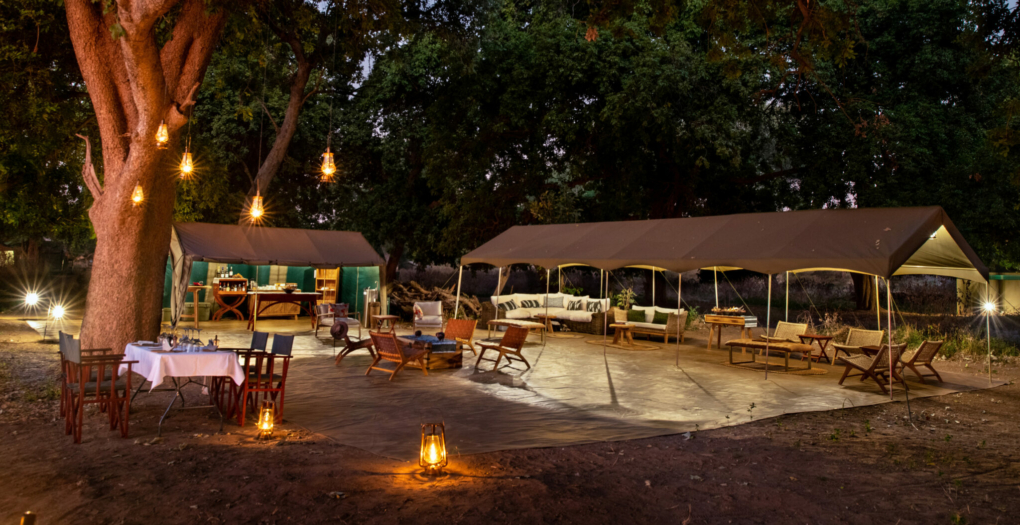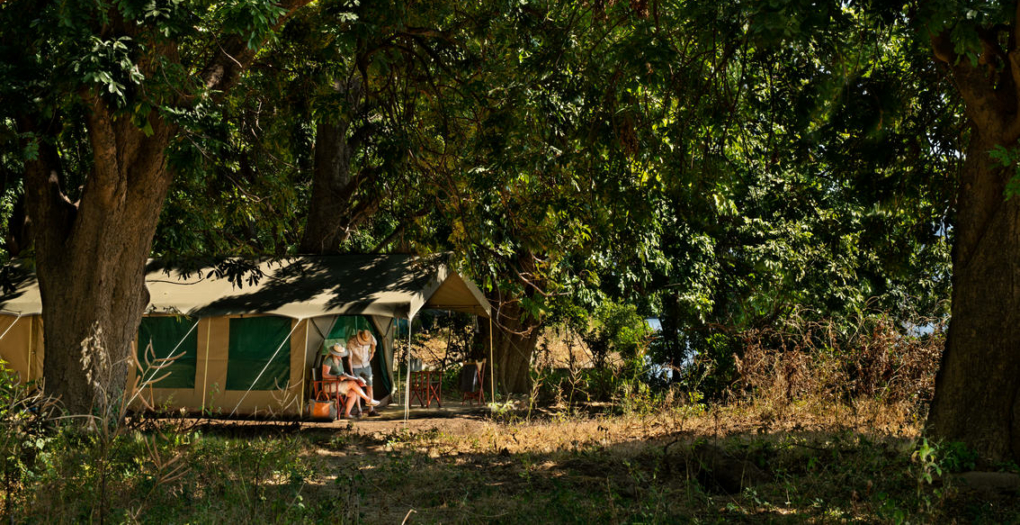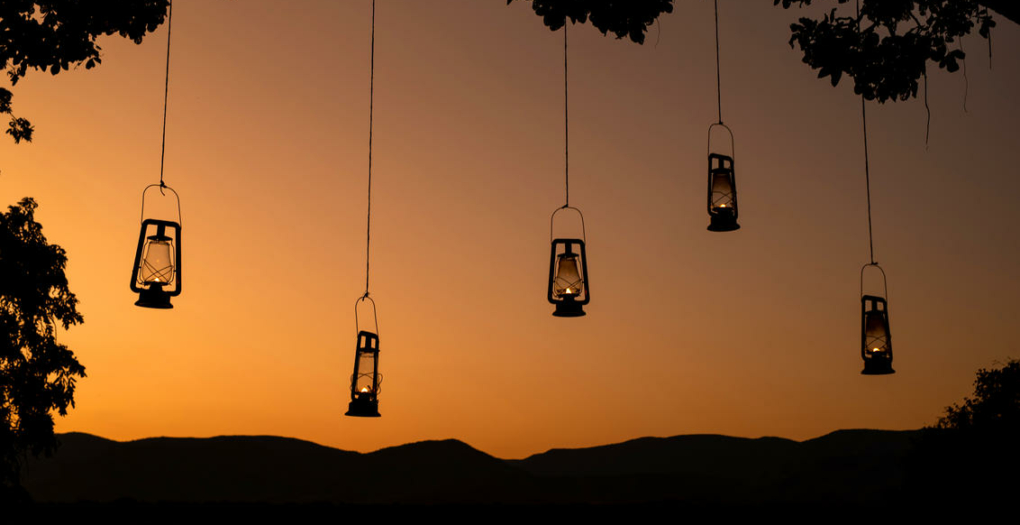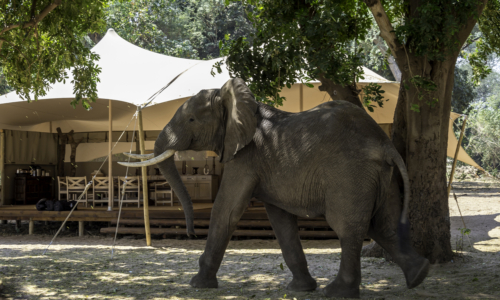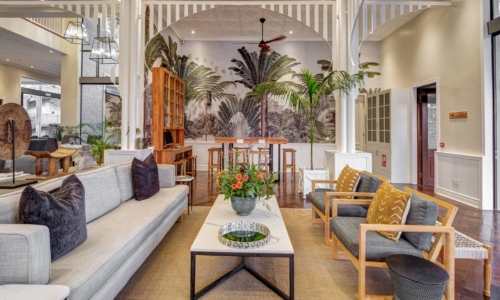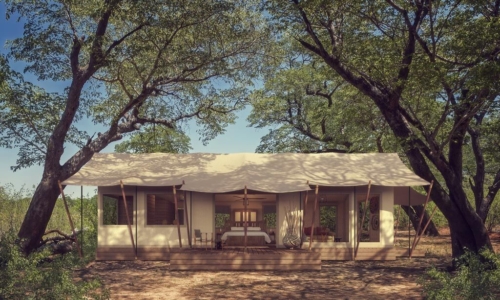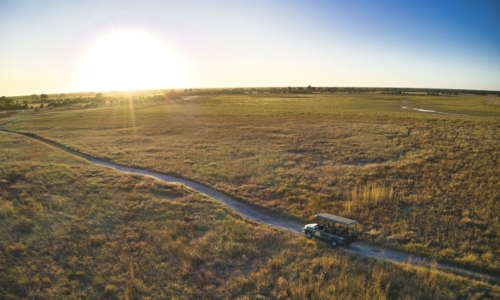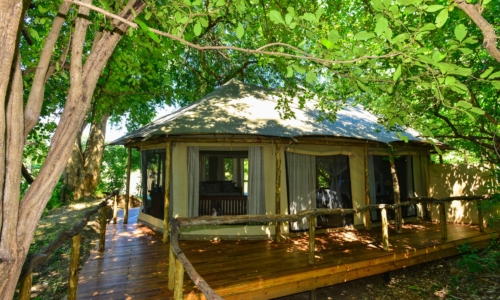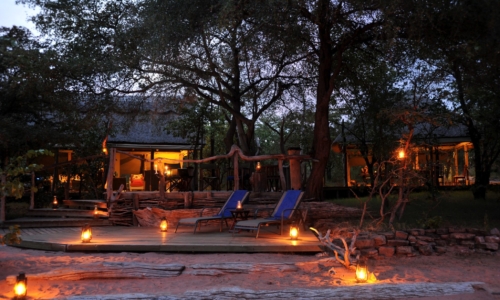Mana River’s six tented rooms are built and styled with practical, nature-inspired comfort. Outside the zipped canvas entryway, there is a covered patio area to enjoy the river views. Comfortable twin beds can be combined into a king bed upon request. Each en suite bathroom has a shower and flushing toilet. There are solar powered lamps in each tent and charging stations in the common lounge area.
Mana River Camp is located in Mana Pools National Park in Zimbabwe on the banks of the Zambezi River. A land rich in diverse wildlife, visitors can enjoy observing a variety of unique bird life as well as the herds of buffalo and elephant that roam the plains. Often animal activity along the river can be viewed from the comfort of each tent’s private patio, and nightly animal calls can be heard through the canvas tent walls.
Camp activities, just like wildlife, depend on the water surrounding the camp. High water levels are perfect for calming mokoro rides along the river. If water levels are not ideal for boating activities, game drives, walking safaris, and birding safaris are great land-based ways to explore the terrain and view wildlife. The camp can arrange visits to nearby villages for guests looking to learn about the culture and community. These trips expose people to the unique foods, languages, arts, and traditions of Zimbabwe.
Mana River Camp prioritizes working in the surrounding community to support schools and other charity efforts. Most of the camp’s private guides and other staff are from the local villages and are eager to give back. Mana River is committed to protecting and preserving the natural beauty of Botswana, whether it be through supporting anti-poaching patrols or educational programs. All these efforts are toward reaching the ultimate goal of sustainable coexistence between the community and the environment.


- Amalinda Lodge
- Bumi Hills Safari Lodge
- Camp Hwange
- Changa Safari Camp
- Chikwenya
- Davison’s Camp
- Deteema Springs
- Ingwe Pan
- Kanga Expeditions
- Linkwasha Camp
- Little Makalolo
- Little Ruckomechi
- Little Vundu
- Mana River Camp
- Matetsi Victoria Falls
- Mpala Jena Camp
- Muddy Teak
- Nyamatusi Camp
- Nyamatusi Mahogany
- Old Drift Lodge
- Pamushana Lodge
- Ruckomechi Camp
- Somalisa Acacia
- Somalisa Camp
- Somalisa Expeditions
- Tembo Plains
- The Elephant Camp
- The Hide
- Verney’s Camp
- Vundu Camp
- Zambezi Expeditions
- Amalinda Lodge
- Bumi Hills Safari Lodge
- Camp Hwange
- Changa Safari Camp
- Chikwenya
- Davison’s Camp
- Deteema Springs
- Ingwe Pan
- Kanga Expeditions
- Linkwasha Camp
- Little Makalolo
- Little Ruckomechi
- Little Vundu
- Mana River Camp
- Matetsi Victoria Falls
- Mpala Jena Camp
- Muddy Teak
- Nyamatusi Camp
- Nyamatusi Mahogany
- Old Drift Lodge
- Pamushana Lodge
- Ruckomechi Camp
- Somalisa Acacia
- Somalisa Camp
- Somalisa Expeditions
- Tembo Plains
- The Elephant Camp
- The Hide
- Verney’s Camp
- Vundu Camp
- Zambezi Expeditions

Mana River’s six tented rooms are built and styled with practical, nature-inspired comfort. Outside the zipped canvas entryway, there is a covered patio area to enjoy the river views. Comfortable twin beds can be combined into a king bed upon request. Each en suite bathroom has a shower and flushing toilet. There are solar powered lamps in each tent and charging stations in the common lounge area.
Mana River Camp is located in Mana Pools National Park in Zimbabwe on the banks of the Zambezi River. A land rich in diverse wildlife, visitors can enjoy observing a variety of unique bird life as well as the herds of buffalo and elephant that roam the plains. Often animal activity along the river can be viewed from the comfort of each tent’s private patio, and nightly animal calls can be heard through the canvas tent walls.
Camp activities, just like wildlife, depend on the water surrounding the camp. High water levels are perfect for calming mokoro rides along the river. If water levels are not ideal for boating activities, game drives, walking safaris, and birding safaris are great land-based ways to explore the terrain and view wildlife. The camp can arrange visits to nearby villages for guests looking to learn about the culture and community. These trips expose people to the unique foods, languages, arts, and traditions of Zimbabwe.
Mana River Camp prioritizes working in the surrounding community to support schools and other charity efforts. Most of the camp’s private guides and other staff are from the local villages and are eager to give back. Mana River is committed to protecting and preserving the natural beauty of Botswana, whether it be through supporting anti-poaching patrols or educational programs. All these efforts are toward reaching the ultimate goal of sustainable coexistence between the community and the environment.

- Amalinda Lodge
- Bumi Hills Safari Lodge
- Camp Hwange
- Changa Safari Camp
- Chikwenya
- Davison’s Camp
- Deteema Springs
- Ingwe Pan
- Kanga Expeditions
- Linkwasha Camp
- Little Makalolo
- Little Ruckomechi
- Little Vundu
- Mana River Camp
- Matetsi Victoria Falls
- Mpala Jena Camp
- Muddy Teak
- Nyamatusi Camp
- Nyamatusi Mahogany
- Old Drift Lodge
- Pamushana Lodge
- Ruckomechi Camp
- Somalisa Acacia
- Somalisa Camp
- Somalisa Expeditions
- Tembo Plains
- The Elephant Camp
- The Hide
- Verney’s Camp
- Vundu Camp
- Zambezi Expeditions
- Amalinda Lodge
- Bumi Hills Safari Lodge
- Camp Hwange
- Changa Safari Camp
- Chikwenya
- Davison’s Camp
- Deteema Springs
- Ingwe Pan
- Kanga Expeditions
- Linkwasha Camp
- Little Makalolo
- Little Ruckomechi
- Little Vundu
- Mana River Camp
- Matetsi Victoria Falls
- Mpala Jena Camp
- Muddy Teak
- Nyamatusi Camp
- Nyamatusi Mahogany
- Old Drift Lodge
- Pamushana Lodge
- Ruckomechi Camp
- Somalisa Acacia
- Somalisa Camp
- Somalisa Expeditions
- Tembo Plains
- The Elephant Camp
- The Hide
- Verney’s Camp
- Vundu Camp
- Zambezi Expeditions













